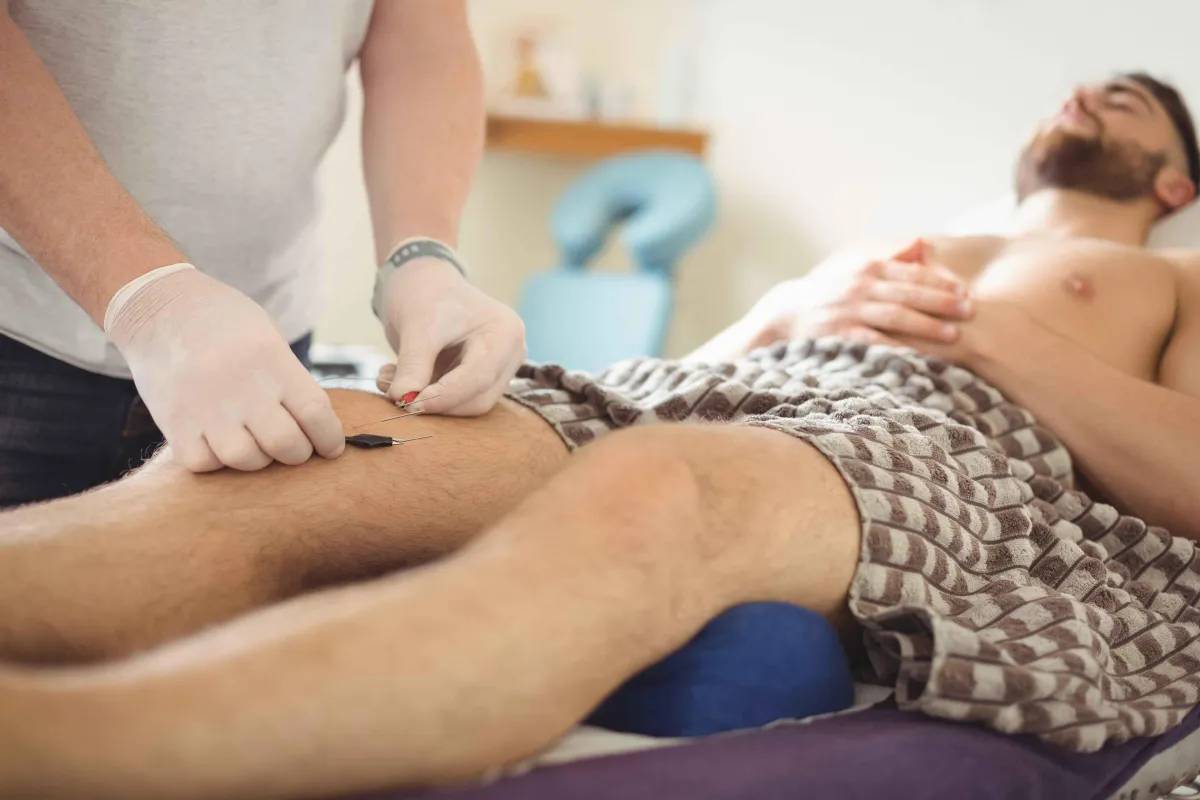Acupuncture for Knee Pain in Clifton, NJ
Clifton Physical Therapy

Introduction
Knee pain can make simple movements—like climbing stairs, walking your dog, or getting out of bed—feel like a challenge. If you’re searching for lasting, drug-free relief, acupuncture in Clifton, NJ offers a safe, natural way to reduce pain and restore your mobility.
At Clifton Physical Therapy, acupuncture treatments are customized to help you move comfortably again—without relying on medication or surgery.
Key Takeaways
Acupuncture relieves knee pain by improving circulation, reducing inflammation, and activating your body’s natural healing response.
It treats the root cause of knee discomfort rather than masking symptoms with medication.
Effective for arthritis, injuries, and post-surgical pain, acupuncture offers a non-invasive path to recovery.
Combining acupuncture with physical therapy accelerates healing and improves long-term joint strength.
At Clifton Physical Therapy, Licensed Acupuncturist John Miller, LAc, tailors each session to your unique condition. Call (973)-241-1338 to schedule your consultation today.
Who Provides Acupuncture at Clifton Physical Therapy?
John Miller, LAc, is a Licensed Acupuncturist at Clifton Physical Therapy in Clifton, New Jersey. With a strong background in orthopedic and trigger-point acupuncture, John specializes in helping patients recover from chronic pain, musculoskeletal injuries, and conditions such as neck and shoulder pain.
Education & Training:
John earned his Master of Acupuncture and Oriental Medicine from the New England School of Acupuncture (NESA), where he trained under Department Chair Stephen Cina in Orthopedic Acupuncture and Trigger Point Therapy. Since 2006, he has also studied Tong Ren Healing with Tom Tam, enhancing his integrative approach to patient care.
What Is Acupuncture and How Does It Work?
Acupuncture is an ancient form of Chinese medicine that uses thin, sterile needles inserted into specific points on the body—called acupoints—to balance energy flow, stimulate blood circulation, and release natural painkillers called endorphins.
For knee pain, acupuncture targets points around the knee joint and related muscle groups to reduce inflammation, relax tight tissues, and promote healing from within. The gentle stimulation of acupoints helps restore communication between nerves, muscles, and connective tissues—allowing the body to repair itself more efficiently.
According to the National Institutes of Health (NIH), acupuncture can be effective for treating osteoarthritis-related knee pain and improving joint function. It’s a holistic alternative to pain medications, offering both symptom relief and functional improvement with minimal risk or side effects.
Why Choose Acupuncture for Knee Pain Relief?
Both physicians and physical therapists increasingly recommend acupuncture for patients struggling with knee pain caused by arthritis, tendonitis, or injuries.
Natural Pain Relief: Acupuncture stimulates endorphin release, reducing pain without the need for strong medications.
Reduced Inflammation: By improving circulation and calming overactive nerve signals, it helps ease swelling and stiffness around the joint.
Faster Recovery: Better blood flow delivers oxygen and nutrients to injured tissues, supporting quicker healing.
Addresses Root Causes: Unlike medication that only masks pain, acupuncture targets the underlying imbalances contributing to chronic discomfort.
Low-Risk and Safe: Treatments are minimally invasive, with very few side effects and no recovery time required.
How Effective Is Acupuncture for Knee Pain?
Clinical studies consistently support acupuncture as an effective treatment for knee pain—especially for conditions like osteoarthritis
Clinical studies consistently support acupuncture as an effective treatment for knee pain—especially for conditions like osteoarthritis. Research published in Arthritis Care & Research found that acupuncture significantly reduced pain and improved knee function in osteoarthritis patients after just a few weeks of treatment.
Patients at our clinic often report noticeable relief after the first few sessions. Over time, they experience greater flexibility, improved range of motion, and reduced stiffness. While individual results vary, consistent sessions typically lead to lasting improvement without the side effects associated with pain medication or steroid injections.
Who Benefits Most from Acupuncture for Knee Pain?
Acupuncture can be beneficial for a wide range of patients—from athletes to older adults—looking for a natural and sustainable way to manage knee discomfort. Common conditions that respond well to acupuncture include:
Osteoarthritis: Reduces chronic joint pain, stiffness, and swelling while improving mobility.
Sports Injuries: Eases pain and accelerates recovery from sprains, strains, and tendonitis.
Post-Surgical Recovery: Minimizes inflammation, supports tissue healing, and enhances flexibility after knee surgery.
Chronic Pain Disorders: Offers relief for patients with rheumatoid arthritis, patellar tendonitis, or overuse injuries.
How Many Acupuncture Sessions Are Needed for Knee Pain Relief?
The number of sessions you’ll need depends on several factors—such as the cause of your pain, its severity, and your overall health. However, a general guideline looks like this:
Acute Pain: 1–2 sessions per week for 4–6 weeks
Chronic or Long-Term Pain: 2–3 sessions per week initially, followed by maintenance sessions every few weeks
Some patients experience noticeable relief after just one or two treatments, while others require several sessions for full improvement. To maintain long-term benefits, occasional follow-up sessions may be recommended.
How Does Acupuncture Compare to Other Knee Pain Treatments?
Physical Therapy:
While physical therapy focuses on strengthening muscles and improving movement, acupuncture helps manage pain and inflammation—making it easier for you to participate in your exercises effectively. Together, they provide a powerful recovery combination.
Medications:
Painkillers may offer temporary relief but can cause side effects with long-term use. Acupuncture provides natural pain relief by stimulating the body’s healing mechanisms, without medication dependency.
Surgery:
For many patients, surgery is a last resort. Acupuncture offers a minimally invasive, drug-free alternative that can delay or even prevent the need for surgical intervention.
What Are the Benefits of Combining Acupuncture with Physical Therapy?
Pain Reduction: Acupuncture reduces pain and inflammation, allowing patients to perform physical therapy exercises more comfortably.
Improved Mobility: While acupuncture loosens tight muscles and relieves stiffness, physical therapy strengthens the surrounding muscles to support the knee joint.
Enhanced Recovery Speed: The combined approach promotes better circulation, muscle balance, and tissue repair, leading to faster healing.
Lower Medication Dependence: Together, these therapies provide lasting relief without the side effects of painkillers.
How to Get Started with Acupuncture for Knee Pain
If knee pain is affecting your quality of life, now is the perfect time to take action. Schedule a consultation at Clifton Physical Therapy to discuss your symptoms and learn how acupuncture can help.
Call (973)-241-1338 to book your appointment today.
Frequently Asked Questions
Question 1Is acupuncture safe for knee pain?
Yes. When performed by a licensed acupuncturist like John Miller, LAc, acupuncture is extremely safe and uses sterile, single-use needles.
Question 2: How soon will I feel results?
Some patients notice improvement after the first session, while others experience gradual relief over several weeks.
Question 3: Can acupuncture replace my pain medication?
Many patients find that acupuncture reduces their need for painkillers. Always consult your healthcare provider before making medication changes.
Question 4: Can acupuncture help after knee surgery?
Yes. Acupuncture can reduce post-surgical swelling, ease stiffness, and promote faster recovery alongside your rehabilitation program.
What patients are saying
"I recently had ankle surgery and Clifton PT has been nothing short of amazing! My goal was to get back to playing soccer as quick as possible before the college season started and so far I'm right on track. Izzy, Bianca, Tiff, and John have gone above and beyond to make sure I'm back to 100%. Couldn't be more grateful to be treated by the best team ever!." - Nat Rufino

All the therapists at Clifton Physical Therapy are awesome, but I spend most of my time with Izzy and Bianca—and they’ve been amazing. They’re enthusiastic, knowledgeable, and always take the time to explain what I’m doing and what my issues are. Their positive energy and clear communication make a big difference in my recovery." - Bryan Tompkins

"Going Clifton physical therapy was one of the best thing that came out of my back pain! Every single staff member is amazing and cares for your recovery! I have been with them for the past couple of months and now continuing their workout program! I can’t recommend them enough! Tiffany, Izzy, Bianca and everyone else I have worked with there! Can’t rave about them enough!!." - Monica Mehta

"Clifton Physical Therapy has been a great place for me to heal my meniscus tear. The staff is very knowledgeable and friendly, and has been extremely helpful in guiding me through my recovery. I highly recommend their services.." - Kelly Bevando

Clifton Physical Therapy
✆ Phone (appointments): (973)-241-1338
Address: 1059 Bloomfield Ave, Clifton, NJ 07012
